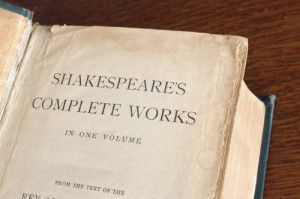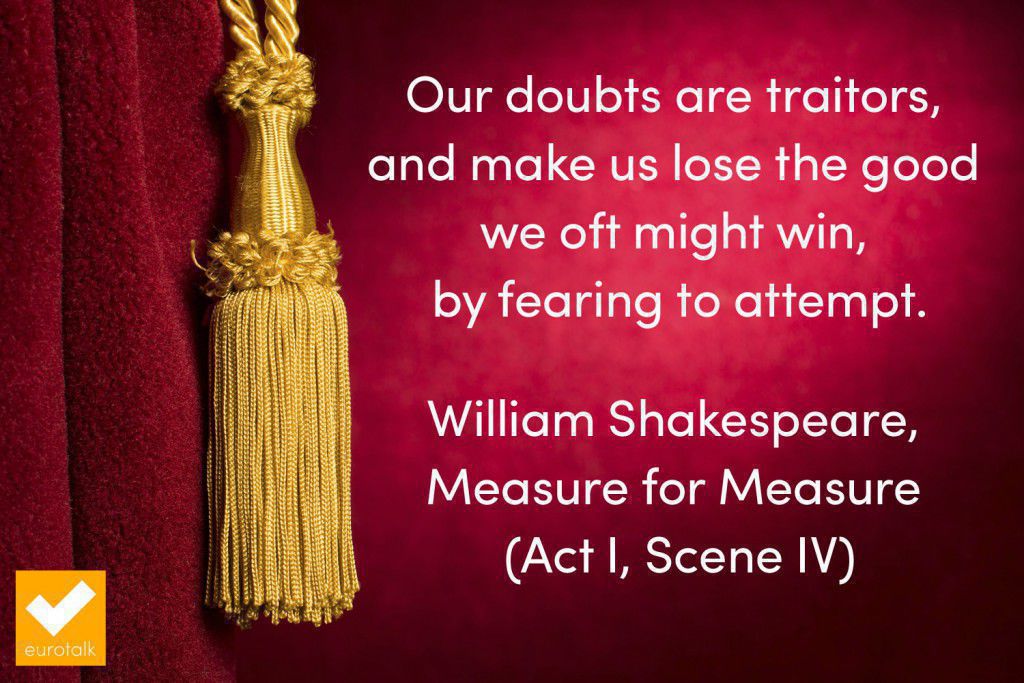How well do you know Saint George?
23rd April is a busy day. Besides being St George’s Day here in England, and the day of Sant Jordi in Catalonia, it’s also Shakespeare’s birthday, the anniversary of the death of Miguel de Cervantes, World Book Day and UN English Language Day 2015. That’s a lot to pack into one day…
Are you celebrating anything today? We’d love to hear about it! And in the meantime, here’s a fun quiz to find out how much you know about the English patron saint. How did you do?
10 popular expressions we owe to Shakespeare
Today is the official anniversary of William Shakespeare’s birth. (23rd April is also the day he died, but let’s not dwell on that.) For those of us who speak English every day, we often forget, or don’t realise, how many of the words and phrases we use come from the works of Shakespeare.
Of course we don’t know for sure that he invented them all himself (although apparently about a tenth of the words he used in his work were new). But it’s interesting to see how many of us, even those who claim not to be fans of his work, are regularly quoting Shakespeare.
There are so many examples of these – here are just a few.
Green-eyed monster
What does it mean? Jealousy.
Which play? Othello (Act III, scene 3) – although Shakespeare had earlier used ‘green-eyed’ to describe jealousy in The Merchant of Venice (Act III, scene 2).
“IAGO: O, beware, my lord, of jealousy;
It is the green-eyed monster which doth mock
The meat it feeds on”
Cruel to be kind
What does it mean? Treating someone badly for their own good.
Which play? Hamlet (Act III, scene 4)
“HAMLET: I must be cruel only to be kind.
Thus bad begins and worse remains behind.”
It’s all Greek to me
What does it mean? Completely incomprehensible.
Which play? Julius Caesar (Act I, Scene 2)
“CASCA: those that understood him smiled at one another and shook their heads; but, for mine own part, it was Greek to me.”
Break the ice
What does it mean? To get a conversation going, often by breaking some initial tension.
Which play? The Taming of the Shrew (Act I, Scene 2)
“TRANIO: And if you break the ice and do this feat,
Achieve the elder, set the younger free”
In a pickle
What does it mean? In a tricky situation.
Which play? The Tempest (Act V, Scene 1)
“ALONSO: How camest thou in this pickle?”
Forever and a day
What does it mean? A really long time!
Which play? As You Like It (Act IV, Scene 1)
“ROSALIND: Now tell me how long you would have her after you have possessed her.
ORLANDO: Forever and a day.”
The world’s my oyster
What does it mean? To have a wealth of opportunities.
Which play? The Merry Wives of Windsor (Act II, Scene 2)
“PISTOL: Why then the world’s mine oyster, Which I with sword will open.”
One fell swoop
What does it mean? All at once.
Which play? Macbeth (Act IV, Scene 3)
“MACDUFF: What, all my pretty chickens and their dam
At one fell swoop?”
Good riddance
What does it mean? To be glad to see the back of someone.
Which play? Troilus and Cressida (Act 2, Scene 1)
“THERSITES: I will keep where there is
wit stirring and leave the faction of fools.
[Exit]
PATROCLUS: A good riddance.”
Eaten out of house and home
What does it mean? To take advantage of a host’s generosity.
Which play? Henry IV Part II
“MISTRESS QUICKLY: He hath eaten me out of house and home; he hath put all my substance into that fat belly of his”
How many of these have you used lately? And does anyone have any other favourite Shakespearean phrases?
Personally, we’re a bit disappointed that more of Shakespeare’s insults haven’t made it into modern English; you don’t hear ‘thou cream-faced loon’ often enough these days (although maybe that’s a good thing). There’s probably a whole other blog post to be had from Shakespeare’s insults – but in the meantime, here’s a random insult generator – have fun, but be careful who you say them to!
Quote of the week: 19 Apr 2014
For more like this, find us on Pinterest.
Embed This Image On Your Site (copy code below):
A feast of languages: Shakespeare as we’ve never seen it before
Last Monday, 23rd April, was the 448th anniversary of the birth of William Shakespeare, and marked the launch of Globe to Globe, a series of Shakespeare’s plays performed over six weeks in 37 different languages at the Globe Theatre on London’s South Bank.
On Monday, Troilus and Cressida was performed in Maori by New Zealand’s Ngakau Toa theatre company. Tonight the audience will watch A Midsummer Night’s Dream in Korean. If that doesn’t appeal, how about The Taming of the Shrew in Urdu, Macbeth in Polish or The Merchant of Venice in Hebrew?
 Even though I don’t speak any of those languages, I’m quite tempted to go along. Not only is this probably a once in a lifetime opportunity, but I’m intrigued to see how the plays will translate. Even for a native English speaker, Shakespeare’s language is not always that easy to understand, so is there a possibility that by watching a play and having literally no idea what’s being said, I could just be putting myself in for a couple of hours of mind-numbing boredom?
Even though I don’t speak any of those languages, I’m quite tempted to go along. Not only is this probably a once in a lifetime opportunity, but I’m intrigued to see how the plays will translate. Even for a native English speaker, Shakespeare’s language is not always that easy to understand, so is there a possibility that by watching a play and having literally no idea what’s being said, I could just be putting myself in for a couple of hours of mind-numbing boredom?
Well, possibly, but I suspect not. Just as an opera can still move an audience who doesn’t speak Italian, the point that’s being made with this festival is that Shakespeare’s themes and the emotions he portrays are so universal, they can be shared with an audience almost without words. The Globe website describes it best: ‘Shakespeare is the language which brings us together better than any other, and which reminds us of our almost infinite difference, and of our strange and humbling commonality.’ Perhaps Shakespeare didn’t anticipate that his work would one day be portrayed through a haka (the warrior dance best known outside New Zealand as the pre-match rugby ritual), but does that make it any less valid?
A couple of weeks ago, I watched a fantastic performance of Henry V by the Propeller Theatre Company. A whole scene of the play takes place in French, a language I don’t speak and which I’m pretty sure a lot of people in the theatre didn’t either. And yet – we all reacted in the same way at the same time to what we were seeing. If you’d asked me afterwards to translate every word the character was saying, I wouldn’t be able to. But I can tell you why it was funny.
Whether I could make it through a whole play is another question – but there’s only one way to find out! Now the tough part – which play to go for…? Any suggestions?
Liz

